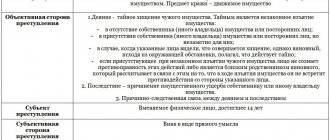The rules of law that establish liability for hooliganism are designed to protect the personal integrity of every citizen and his human dignity from the unlawful behavior of other individuals. Let's consider what the ingredients of this offense are, what article for petty hooliganism threatens a person behaving immorally, how hooligan actions differ from other illegal acts.
According to Russian legislation, petty hooliganism refers to administrative offenses that impinge on public safety and public order. They are written out in Chapter 20 of the Code of Administrative Offenses of the Russian Federation. So, let's look at Art. 20.1 Code of Administrative Offenses of the Russian Federation with comments.
According to Part 1 of Art. 20.1 of the Code of Administrative Offenses of the Russian Federation, petty hooliganism consists of violating public order (hereinafter referred to as OP):
- expressing obvious disrespect for society, disregard for norms, rules and traditions of behavior in public places;
- accompanied by swearing using obscene language, offensive harassment of passers-by (spectators, customers, etc.);
- involving damage or destruction of someone else's personal property, which does not result in significant material damage.
Such actions entail either a monetary penalty - an administrative fine in the amount of 500 to 1000 rubles, or administrative arrest for up to 15 days.
The same actions, accompanied by disobedience to the legal requirement of any person engaged in protecting the OP or suppressing its violation (policeman, vigilante, etc.), entail a penalty in the amount of 1 thousand to 2.5 thousand rubles. or administrative arrest for the same period, but on the basis of the 2nd part of the article “Petty hooliganism” of the Code of Administrative Offenses of the Russian Federation.
Important: the article “Petty hooliganism” of the Criminal Code of the Russian Federation does not exist, since criminal liability in Russia is provided only for hooliganism that is not petty.
Comments on the article
The objective side of the illegal actions of a petty hooligan:
- disrespectful attitude towards strangers or unfamiliar citizens, expressed in a public place;
- immoral behavior contrary to generally accepted moral standards;
- committing active harmful acts.
So, according to the official commentary, petty hooliganism consists of an attempt to humiliate and/or insult a stranger. In turn, offensive harassment is obsessive, daring actions that cause moral and slight physical harm to the victim.
The subjective side of petty hooliganism is the presence of direct intent in the offender’s actions. He foresees their harmful consequences and deliberately seeks to humiliate the dignity of the victim, encroaching on her personal integrity.
The law prescribes that administrative offenses subject to punishment under Article 20.1 part 1 (or part 2) of the Code of Administrative Offenses of the Russian Federation should be distinguished from other administrative and criminal offenses.
First of all, it is necessary to distinguish between petty hooliganism and criminal hooliganism prescribed in Article 213 of the Criminal Code of the Russian Federation. The corpus delicti is present in a gross intentional violation of the OP, expressing disrespect for society:
a) using weapons or objects used as weapons;
b) based on ideological, national, political, racial or religious enmity or hatred or hatred (hostility) towards a certain social group;
c) by public transport - air, rail, sea, etc.
If, out of hooligan motives, intentional damage or destruction of the victim’s personal property was committed, resulting in significant material damage, the actions of the offender are qualified under Part 2 of Art. 167 of the Criminal Code with a sanction of up to 5 years of forced labor or imprisonment.
Deliberate damage to property in public places, including transport, or desecration of buildings/structures, committed out of hooligan motives, is classified as vandalism (Article 214 of the Criminal Code) or under the combination of Articles 213 and 214 of the Criminal Code.
Arbitrage practice
When distinguishing between criminal hooliganism and an administrative offense entailing arrest or a fine under the Code of Administrative Offences, Article 20.1, Part 1 (Part 2), the authorities take into account the judicial practice summarized in Resolution No. 5 of the Plenum of the Supreme Court of the Russian Federation dated December 24, 1991 (as amended by Resolutions of the Plenum of the Supreme Council No. 11 of December 21, 1993, No. 10 of October 25, 1996).
This document:
- establishes the concept of “malicious hooliganism”;
- explains the procedure for qualifying resistance to a person guarding the OP and/or suppressing hooligan actions;
- regulates the distinction between hooliganism and other crimes/offenses directed against the individual;
- instructs the courts to consider the issue of recognizing the state of intoxication in which hooliganism was committed as an aggravating circumstance;
- orders judges not to allow persons who have committed similar crimes (insult, arbitrariness, beatings, causing minor bodily harm, etc.) or other administrative offenses (violation of traffic rules on roads and streets, appearing in a state of intoxication) to be held administratively liable under the Code of Administrative Offenses for petty hooliganism in public places, etc.).
Important: cases of administrative offenses provided for in the mentioned article of the Code of Administrative Offenses are considered by officials of the Ministry of Internal Affairs - from the heads of territorial divisions to local inspectors - specified in Art. 23.3 of the Admin Code. But these officials have the right to refer administrative cases of petty hooliganism to the magistrates' courts. And only in the competence of the latter to impose punishment on offenders in the form of administrative arrest - the police have the right only to fine.
In addition to the fact that signs of a crime, and not an administrative offense, can be identified by a magistrate’s court, the activities of the police are also monitored and controlled, which makes it possible to cancel the decision to bring to administrative responsibility for petty hooliganism with the further prosecution of the guilty person for another offense.
Administrative hooliganism
More precisely, in accordance with the Code of Administrative Offenses of the Russian Federation, such hooliganism is called petty hooliganism - indeed, compared to a criminal act, an administrative offense is quite insignificant both in content and in punishment. Article 20.1 of the Code of Administrative Offenses of the Russian Federation provides for liability for violation of public order, which can be expressed as follows:
- obscene language in a public place . Basically, people who have been drinking heavily, use rude words, name-calling, comparisons, etc. in a loud conversation are punished for this. Those who calmly talk to each other (even if using a “click phrase”) are not held accountable, since they have not violated public order;
- offensive harassment of citizens . Quite often, the actions of those who ask passersby to give money, smoke, escort, etc. are regarded as hooliganism;
- destruction (damage) of property is one of the ways to show disrespect for society (damage to a car mirror, dishes in a cafe, etc.). If actions indicate a deliberate intent to cause harm to someone, a separate article on damage to property applies.
All of the above actions can be performed either simultaneously or separately, but always in a public place.
According to the meaning of the law, this is the place in which people are or have the right to be; it is not the object of someone’s personal property. Public places are considered to be parks, streets, shops, theaters, parking lots, playgrounds, institutions, etc. Even staircase landings can be a public place. The concept of public place is equally relevant to both administrative and criminal law.
Example No. 1 . Standing in line at the bank, Nekrasov P.A. noticed that the man approached the operator, bypassing all the people standing in front of him, despite the strict queue based on electronic tickets. Nekrasov A.P. at first calmly, and then raising his tone, he became indignant. The man explained that 10 minutes ago he had already visited this operator and only wanted to clarify the number of the contract under which the consultation was held. Nekrasov A.P. addressed the operator, the head of the bank, the man who repeatedly applied for advice, with rude obscene language and left the branch. Subsequently, he was prosecuted under Art. 20.1 Code of Administrative Offenses of the Russian Federation.
In this example, it is clear that the place where the incident occurred is public (a bank), and the perpetrator performed one of the actions that falls under the signs of petty hooliganism (insult with gross obscene language).
Example No. 2 , where the administrative offense was not confirmed. Neighbors in summer cottages damaged each other's property during the conflict. Solovyova N.R. broke part of the fence for neighbor K.E. Nikitina, and she, in turn, tore flowers from a flowerbed on N.R. Solovyova’s property. There may be an administrative offense or a crime related to damage to someone else's property, but not hooliganism. Firstly, private households and adjacent areas are not public places, and secondly, the intent of both women was not aimed at disturbing public order.
Personal conflictual relationships always exclude hooliganism. Therefore, incidents between husband and wife, other family members, and persons who have persistent hostile relationships towards each other can never be considered an offense under Art. 20.1 Code of Administrative Offenses of the Russian Federation.
Punishment for troublemakers is imposed by a court order and can be as follows:
- fine from 500 to 1000 rubles ;
- administrative arrest for up to 15 days .
If petty hooliganism is associated with disobedience to police officers, the act falls under the criteria of Part 2 of Art. 20.1 of the Code of Administrative Offenses of the Russian Federation and entails arrest for the same period or a fine of up to 2,500 rubles .
What is the offense of using obscene language in a public place?
Swearing in itself is not prohibited and is not an offense. But this is relevant as long as the swearing does not affect the rights of other persons. In the latter case, swearing becomes an administrative offense. The norms of the Code of Administrative Violations (CAO) prosecute swearing in a public place and swearing that is used to insult a person.
A violation is swearing not only verbally, but also in the media, since in this case it can violate the rights and legitimate interests of citizens and a wide audience of readers.
Responsibility for swearing comes on the basis of the following norms of the administrative code:
- Article 20.1. Petty hooliganism.
- Article 5.61. Insult.
Punishment for swearing includes a fine of up to 5 thousand rubles. Compensation for harm is made in monetary form, and its amount is determined by the court depending on the degree of moral suffering caused, as well as the degree of guilt of the offender.
Hooliganism in criminal law
Hooliganism in the criminal legal sense always expresses a more flagrant disrespect for society than in administrative law.
This can manifest itself in an indifferent attitude towards people, their quiet life and usual rhythm, work, while the demonstration of disregard for the rights of others is more active and can create danger for others. In other words, actions falling under the characteristics of Art. 213 of the Criminal Code of the Russian Federation, must be “out of the ordinary”, not typical for a civilized society, and sometimes quite aggressive. At the same time, a very similar crime – vandalism – should be distinguished from hooliganism. Vandals are brought to criminal liability much less often than hooligans, but nevertheless such cases are periodically considered in the courts, and the perpetrators are given restrictions or imprisonment for up to three years. Vandalism means the desecration of monuments, buildings, public transport or municipal property. Here the main sign is damage to property in a public place (this criterion is not in Article 213 of the Criminal Code of the Russian Federation), and such an action can be carried out not in full view of passers-by, but in secret.
Example No. 3 . A group of teenagers used spray paint to write graffiti on the wall of a historic building. The municipality suffered damage to a fairly significant amount - 120,000 rubles. Since the paint could not be removed without the use of special solvents, as a result the coating of the building’s walls was damaged, partial collapse began, and the need for restoration work arose. The teenagers were punished for vandalism, since their intent was to damage municipal property, which they carried out at night, secretly, and only thanks to surveillance cameras were they able to identify the violators from a photo taken.
Read more about vandalism in our separate article.
Administrative responsibility according to the laws of the constituent entities of the Russian Federation
In addition to the main offenses provided for by the Code of Administrative Offenses of the Russian Federation, almost every region has its own laws establishing liability for other types of violations of public order:
- Article 3.4 of the Moscow Region Code of Administrative Offenses provides for a fine of up to 5,000 rubles for those citizens who do not comply with restrictions aimed at ensuring public order and morality.
- Article 2.4 of the Law of the Arkhangelsk Region “On Administrative Violations” provides for liability for violators of silence and public order at night - from 10 pm to 7 am on weekdays and from 10 pm to 10 am on weekends and holidays in apartment buildings, courtyards, etc. d. Those involved in scandals in the entrances of apartment buildings, as well as those who like to set off fireworks, firecrackers, etc. at the specified time (with the exception of New Year's Eve) they may be fined up to 2,500 rubles.
- in accordance with Article 49 of the Code of the Omsk Region on Administrative Offenses, officials can be fined 3,000 rubles for failure to comply with their duties to limit access to the premises of objects with large numbers of citizens (educational or sports institutions, cultural facilities, etc.), which resulted in a violation public order.
- on the basis of Art. 7.2 of the Law “On Administrative Offenses in the Orenburg Region” a citizen can be fined 3,000 rubles (for a repeated violation - 5,000 rubles) for performing natural necessities in a public place.
- Article 2.7 of the Law of the Republic of Karelia “On Administrative Offenses” provides for a fine of up to 2,500 rubles for violating public order when attending cultural, entertainment and other public events.
- Article 11.4 of the Law of the Ryazan Region “On Administrative Offences” provides for a fine of up to 2,000 rubles for street fortune-telling, pestering citizens and begging.
Features of hooliganism under the Criminal Code
Until 2003, mandatory signs of hooliganism (Article 213 of the Criminal Code of the Russian Federation) were the use of violence against other people or damage to other people's property. From December 8, 2003 to this day, another version has been in effect, where these signs are not present (any bodily injury and damage to property are qualified by separate articles of the Criminal Code of the Russian Federation), but there are others:
Use of weapons
The perpetrator can use any type of weapon (firearm, traumatic, etc.), as well as objects as weapons. If there is no permit for a weapon, the actions of the guilty person may additionally be qualified as illegal acquisition, storage, carrying, etc. The objects that can be used can be knives (not related to bladed weapons), sticks, bats, stones, improvised tools - in a word, anything that can cause bodily harm.
According to the law, using a weapon means actions that clearly indicate the intention to use it specifically against people. Thus, simply being in the hands of some object (without demonstration, direction towards the victim), which theoretically can strike or damage someone else’s property, cannot be recognized as being used, which excludes liability under the Criminal Code of the Russian Federation, but entails administrative punishment for minor hooliganism.
Example No. 4 . Perikov A.V., being heavily intoxicated due to the loss of his job, was angry at the Government, the President and, in general, the authorities in general. He came to the district administration building, took several cobblestones from a nearby construction site and threw them all at the windows of the building, while using crude obscene language. Perikov saw perfectly well that there was a guard at one of the windows, but still threw a stone at him, and was subsequently prosecuted for hooliganism, since during a violation of public order he used objects as weapons (cobblestones).
In the above example, the security guard suffered minor bodily injuries, and the administration’s property suffered damage in the amount of 14,000 rubles, which was the basis for additional qualification under Art. 115 of the Criminal Code of the Russian Federation, 167 of the Criminal Code of the Russian Federation. Perikov was punished for three crimes at once.
Items that can be used by a hooligan and result in liability under criminal law can be absolutely anything. The Supreme Court of the Russian Federation gives in its explanations an example when a guilty person violates public order while simultaneously using an animal (dog) for the purpose of intimidation and creating danger for people. A man set his dog on passers-by in a crowded place. In such cases, this will also be considered the use of items qualified under Art. 213 of the Criminal Code of the Russian Federation.
National motive
when criminal acts are carried out due to racial hatred, rejection of religious beliefs, etc.
In cities that can be called multinational, manifestations of hatred towards representatives of a certain social group are not uncommon. Thus, in one of the regions of Russia, several young people, susceptible to radical nationalist views (intolerance towards Tatars), deliberately provoked fights with people from the Republic of Tatarstan, approaching them on the street and starting to push them in the back. Since there were several similar episodes, the investigation was able to prove the presence of a national motive in the actions of the perpetrators, who were subsequently convicted under Art. 213 of the Criminal Code of the Russian Federation.
The listed qualifying features can be either individually or all together at the same time.
Law and order in society
In a rule-of-law state, respect for the rights of citizens is guaranteed by the Constitution of the Russian Federation - the fundamental law followed by all legal systems - civil legislation, administrative, criminal. The norms of each of these legal systems, in order to protect the interests of citizens, fight against violators of law and order, that is, those principles and rules adopted at the state level that are appropriate in the civilized world.
Legal order provides a system of social relations that arise between people, promotes the achievement of legality and suppresses violations of the law. This order excludes arbitrariness and disrespect for fellow citizens, and maintains the necessary comfort of social relations with the help of laws that are obligatory for all people.
The legislation of the Russian Federation does not provide the exact term of public order. We can say that in meaning it is similar to the rule of law, but it is governed not only by legal laws, but also by norms of generally accepted behavior, discipline, morality and ethics. This is an established system of relations between people, based on mutual respect and rules of community life, dictated by long-standing traditions and stages of development of the state. By not following the rules of such a system, a person may be held accountable.
Violations of public order always involve inconvenience to other citizens. Thus, their rights to rest, silence, work, and comfortable living are not respected. Examples of such behavior include screaming on the street at night, breaking windows in cafes, schools, shops, and vandalizing counters at markets and fairs.
Screams and damage to property in a separate residential area cannot be considered a violation of public order, since housing is not a public place within the meaning of the law. Such places will be considered streets, parks, catering establishments, hospitals, public gardens, public transport, adjacent areas of high-rise buildings, that is, places where people who are strangers to the offender are located. Territories that are used as individual property and access to which is closed to other persons are not public places - for example, a private garden of a household.
According to Russian legislation, a violator of public order can be prosecuted, first of all, under the criminal or administrative codes of the Russian Federation .
In addition, each region may have its own codes of administrative offenses or laws, according to which fines may be imposed on the violator for certain illegal actions directed against public rules.
Punishment for criminal hooliganism
The guilty person may be assigned:
1. Fine from 300,000 to 500,000 rubles; compulsory labor (up to 480 hours), correctional labor (up to 2 years); imprisonment (up to 5 years).
Based on judicial practice, in relation to persons involved under Part 1 of Art. 213 of the Criminal Code of the Russian Federation for the first time, they are rarely prescribed imprisonment. In the vast majority of such hooligans, they will face punishment in the form of correctional labor or suspended imprisonment.
2. Fine from 500,000 to one million rubles; imprisonment for up to 7 years.
This measure of responsibility applies to those who committed hooligan acts in a group, having previously agreed with their accomplices . The same punishment awaits those who resisted people trying to stop a violation of public order (they could be both police officers and ordinary passers-by).
It should be noted that the commission of a crime with such additional characteristics is often accompanied by other acts. Group actions are almost always associated with causing bodily harm, including serious injuries, damage to property, and damage to complete strangers. Therefore, in such situations, convicts are more often assigned to serve their sentences in places of deprivation of liberty; a fine is applied by judges quite rarely.
3. A separate punishment only in the form of imprisonment (without alternative) up to 8 years of imprisonment is threatened in the case of the use of explosives .
Insulting a government official while performing his duties
If Art. 130 of the Criminal Code, which dealt with insults to ordinary citizens, has lost force today, but criminal liability for insulting a government official remains. According to Art. 319 of the Criminal Code, a person can be held accountable for insulting a government official in the performance of his official duties .
This article provides for the following penalties:
- Fine up to 40 thousand rubles. or in the amount of the convicted person’s salary for a period of up to 3 months.
- Mandatory work up to 360 hours.
- Correctional labor for up to a year.
Changes in the law
Since April 2022, a completely new type of hooliganism has been introduced into the criminal legislation, allowing the police to recognize as a crime, and not an administrative offense (as it was before), the actions of rowdies on board airplanes, on trains, etc.
The reason for the introduction of a new rule of law was the increasing number of cases of inappropriate behavior of passengers, which caused panic among other people who found themselves together on the same bus, plane, or train. Particularly shocking situations have long been posted on the Internet and are publicly available for viewing.
Legislators considered that removing a hooligan from board is not enough, because there are cases of repeated inappropriate behavior on transport by those previously prosecuted for similar actions.
For criminal liability, the type of transport on which events take place is not important - it can be air, underground (metro), water (boats, river trams), or land (buses). To constitute a crime, it is necessary that the transport in which the hooliganism occurred belongs to the category of public transport. That is, access on board for other citizens who have purchased a ticket or received an invitation must be open.
Considering that changes to Article 213 of the Criminal Code of the Russian Federation came into force only in the spring of 2022, judicial practice does not yet know the sentences that would convict persons who violate public order while traveling.
The procedure for proving a violation and bringing to justice for obscene language
The decision to initiate a case of an administrative offense for swearing according to the rules of Art. 28.4 of the Code of Administrative Offenses falls within the competence of the prosecutor and is considered in court, in accordance with Part 1 of Art. 23.1 Code of Administrative Offences. Only the prosecutor has the right to initiate such administrative cases.
In this regard, a significant number of complaints received by the prosecutor’s office are related to insults to citizens. Not all insults may be grounds for the prosecutor to take response measures.
Based on Art. 5.61 of the Administrative Code, an insult can be considered a negative assessment of the victim’s personality, which violates the honor and dignity of the victim, expressed in an indecent format. It is the indecent form of insult that makes the offense an administrative crime.
The determining factor in deciding whether there is an offense under Art. 5.61 of the Administrative Code is not the fact that the victim perceived the act as degrading honor and dignity, but whether an indecent form of speech took place.
Within the meaning of the law, an indecent form can be considered one that clearly contradicts moral norms and rules of public behavior. The establishment of this characteristic is a matter of fact and is decided by the law enforcement officer, taking into account the circumstances of the case.
In an administrative offense case, it is necessary to establish the presence:
- events of an administrative offense;
- the person who committed the illegal acts;
- the guilt of the person who committed the offense;
- mitigating and aggravating circumstances of the incident;
- circumstances that make it impossible to proceed with an administrative offense;
- other circumstances that make it impossible to proceed with the case.
Based on the results of taking into account the above circumstances, the prosecutor makes a decision to initiate an administrative case or to refuse to initiate it.
Often citizens' appeals to bring a certain person to justice are not supported by anything and are denied by the accused, therefore the prosecutor refuses to initiate a case.
Insult is characterized by a deliberate form of guilt of the accused. Any sane person over the age of 16 can be held accountable.
What difficulties may arise
In reality, the application of the Code of Administrative Offenses regarding insult to personality raises many difficulties. The main problems of law enforcement practice are:
- Uncertainty of the terms “honor” and “dignity”. Thus, in the Civil Code these concepts are inalienable and intangible personal rights.
- The concept of “indecent form” is not subject to unambiguous definition and assessment. Such an assessment is always subjective and determined by the decision of the judge. In this case, the judge may request a linguistic examination.
- According to judicial practice, a person must prove that the insults were directed at a specific person, and not at events in general. A person must be aware of the humiliation of the honor and dignity of another person and desire it.
Hooliganism on the phone
There is no information in the press about a legislative initiative to introduce separate liability for telephone hooliganism. We think that in the future it is quite possible that such a norm will appear, most likely in administrative legislation.
Each of us may encounter annoying calls from known or unknown persons playing pranks on the caller as a joke. Callers cannot help but understand that with such actions they violate the peace of citizens and the right to rest, waste their time and, what can I say, nerves. But currently the legislation does not provide for liability for hooliganism over the telephone .
Formally, one can state the signs of petty hooliganism (for example, gross obscene language, disrespect for society, offensive harassment), but there is no main criterion - violation of public order. Subsuming communication over a distance using means of communication under this term will not be correct and legal.
And yet, a certain responsibility for some telephone actions that are inherently hooligan, but do not fall under Art. 20.1 Code of Administrative Offenses of the Russian Federation or Art. 213 of the Criminal Code of the Russian Federation, may occur for:
- knowingly false report of a crime (such a statement may well be made by telephone to the department’s duty station) - Art. 306 of the Criminal Code of the Russian Federation;
- knowingly false report of an act of terrorism (over 100 false calls about bombs in institutions are recorded annually only in the Moscow region) - Art. 207 of the Criminal Code of the Russian Federation;
- insult (if you are insulted by phone or SMS, that is, they call you words that degrade your honor and dignity) – Art. 5.61 of the Code of Administrative Offenses of the Russian Federation, an application to initiate administrative proceedings should be addressed to the prosecutor's office.
Swearing at a specific person
If obscene language is expressed not in a public place, but in relation to a specific person, then the citizen can be held accountable under the provisions of Art. 5.61 Code of Administrative Offences. Insult becomes the object of prosecution according to the norms of administrative law, since the citizen’s right to honor and dignity is the object of protection of the Constitution. According to Part 1 of Art. 21 of the Constitution, nothing can become a basis for derogation of dignity. According to Part 1 of Art. 23 of the Constitution, every Russian is entitled to the protection of honor and good name.
Until 2011, insult to personality was a criminal offense, but then it was decriminalized (we are talking about Article 130 of the Criminal Code (CC)). The special elements of this crime remain in Art. 148, 297, 319, 336 of the Criminal Code. But they apply to a limited circle of citizens against whom the crime was committed (for example, against a judge or jury), to limited subjects of the offense (for example, against a military serviceman) and limited circumstances of the commission of the crime (for example, the victim was performing his official duties at that moment ).
So, according to the norms of Part 1 of Art. 5.61 of the Code of Administrative Offenses, insulting another person is a humiliation of his honor and dignity, expressed in an indecent form . It threatens the violator with an administrative fine in the amount of 1000-3000 rubles. If the illegal act was committed by an official, then the fine is 10-30 thousand rubles, for a legal entity - 50-100 thousand rubles.
Part 2 art. 5.61 of the Code of Administrative Offenses represents a qualified administrative offense . The qualifying feature is the publicity of offensive actions that help to humiliate the victim in front of other persons. The fine under this article is at least 3000-5000 rubles. For officials, fines increase to 30-50 thousand rubles, for legal entities - 100-500 thousand rubles.
Another qualified team, according to Part 3 of Art. 5.61 of the Code of Administrative Offenses – failure to take measures to prevent insults in a public format . In contrast to the above-mentioned elements of the offense, the specified legal norm refers only to special subjects: officials and legal entities. If measures are not taken to prevent insult in a work or in the media, officials will have to pay a fine of 10-30 thousand rubles, legal entities - 30-50 thousand rubles.
The subjects who must prevent or suppress illegal acts and insults can be editors of newspapers and magazines, editors on radio or television.
In addition to being brought to administrative liability, a person who has insulted another person, under the Civil Code, faces the possibility of recovering moral damages. Such compensation is paid in cash, and the amount is determined taking into account the nature of physical or moral suffering.
Summarize
- Hooliganism can be either administrative (minor) or criminal. For administrative liability, it is enough to insult others or damage property in a public place; for a criminal offense - use weapons (objects), act on a national basis, or cause chaos during a trip.
- Such actions always violate public order and are always committed only in a public place, the signs of which are:
- accessibility for citizens;
- lack of isolation, personal property status;
- public may include not only areas of the area, but also buildings (where people can freely be), transport (for example, a minibus), and structures.
- Conflicts that arise due to hostile personal relationships (for example, between neighbors, relatives) do not qualify as hooliganism: it is believed that in such situations the perpetrator has no intention of disturbing the peace of other citizens.
- The most severe punishment for committing petty hooliganism is administrative arrest for 15 days; in a criminal case - 8 years in prison.
What is checkmate
Obscene language, or swearing, is part of the vocabulary of the Russian language, which contains obscene and rude expressions. Mat is often used in the position of representatives of the social bottom - citizens who are prone to antisocial behavior. Swearing can be used without address, and then it refers to a spontaneous reaction to the resulting stress, a kind of emotional interjection. But it can also be used when trying to insult another person.
Swearing is expressions that are condemned by the public and insult the interlocutor, belittling his dignity.
Differences between an offense and a crime
Article 213 of the Criminal Code of the Russian Federation establishes criminal liability for gross violation of public order, expressing clear disrespect for society. But at the same time, such actions involve the use of weapons or the threat of their use. Or on public transport. Or based on racial, national or other hostility or hatred. Or by prior conspiracy, with resistance to a government official, with the use or threat of using explosives.
As can be seen from the corpus delicti, hooliganism carries greater potential harm to legally protected relationships. Intent also matters here (to use weapons, explosives, etc.). It is by the degree of threat that petty hooliganism and hooliganism differ.
What is personal insult
According to the law, humiliation of the honor and human dignity of another person is considered an insult to the person (Part 1 of Article 5.61 of the Administrative Code). At the same time, rudeness and insult to a person, in order to be considered an offense, must be expressed in an indecent form, that is, in a way contrary to generally accepted morality and ethics. In this case, it does not matter whether the essence of moral humiliation corresponded to reality or not (the second option is slander), the main thing is that it was committed in an indecent form.
Insult can be inflicted in different ways: verbally, in writing, in direct contact or outside it, in the media and on the Internet. To humiliate honor and dignity, both offensive nicknames and obscene expressions can be used. Recently, the content of the concept of “insult” in legislation has expanded significantly, and the scope of responsibility for violations has covered the Internet and social networks.
Reader Questions
Can there be criminal liability for petty hooliganism?
Responsibility of this kind is possible only for a gross violation of public order, since there is no article for petty hooliganism in the Criminal Code of the Russian Federation. For example, there must be one of the aggravating factors:
- Availability of weapons;
- Hateful motive towards any social, political or national group;
- Committing an act of hooliganism in transport, including sea and air transport.
We are all human beings and residents of one country, and therefore must respect the dignity of everyone, without resorting to acts of petty hooliganism. Even though responsibility for it is not spelled out in the Criminal Code of the Russian Federation, you should understand for yourself that violating public order is not a solution to any problem.
Composition of the offense of “petty hooliganism”
The object of petty hooliganism is public order. That is, a system of relations between people, rules of behavior, including those established by morality, customs and traditions, ensuring the normal functioning of society and the state.
The objective side is only actions. Moreover, committed in certain places, called public places. What this is, the law does not decipher. Judicial practice follows the path that these are areas of terrain, structures, buildings, etc., intended for free (or for a fee) visit by citizens. Therefore, housing and individual development will not be a public place. And there will be an office building where services are provided to citizens.
Such actions are associated with clear disrespect for society. That is, violation of the rules established in society is demonstrative in nature. “Showdowns” with a neighbor based on personal hostility will not be petty hooliganism. But if the offender pursued the goal of disturbing public order, this is already petty hooliganism.
The subject is a citizen of the Russian Federation, a foreign citizen or a stateless person who has reached 16 years of age.
The subjective side of the offense has its own distinctive features. The motive for committing such actions as petty hooliganism is of paramount importance. And such actions can only be intentional (clear disrespect for society).







